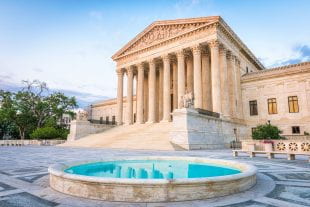EXPERT ALERT
Amy McCaig
713-348-6777
amym@rice.edu
As Supreme Court tackles LGBTQ employment rights, Rice U. experts are available for comment
HOUSTON – (Oct. 2, 2019) – Next week, the U.S. Supreme Court will examine a trio of cases to determine if federal employment protections extend to LGBTQ Americans. Rice University experts are available to comment on the cases themselves — and how academic research shows that protecting LGBTQ people in the workplace also protects a company’s bottom line.
Brian Riedel, associate director of the Center for the Study of Women, Gender and Sexuality, is available to discuss the specifics of the cases.
“Although it is premature to predict how the nine justices might vote, common wisdom toward any decision is that Justice (Brett) Kavanaugh’s presence in the court shifts the balance to five conservative and four liberal voices,” Riedel said. “Any one conservative voice could thus become a deciding vote.”
When reviewing prior decisions by Supreme Court justices John Roberts, Clarence Thomas, Neil Gorsuch and Samuel Alito (Masterpiece v. Colorado in 2018, Obergefell v. Hodges in 2015, U.S. v. Windsor in 2013, Lawrence v. Texas in 2003 and Romer v. Evans in 1996), Riedel said it could be argued that these four justices are unlikely to cast that swing vote.
“However, in the realm of Title VII cases, the court issued a unanimous decision in the 1998 case of Oncale v. Sundowner Offshore Services, Inc.,” he said. “They found that Title VII’s protection against discrimination in the workplace ‘because of … sex’ does apply to harassment between members of the same sex. Justice Clarence Thomas wrote a concurrence in that case.”
Riedel said these past rulings suggest a few points to expect.
“In 2015, the Equal Employment Opportunity Commission issued an opinion, persuasive but not binding on federal district courts, that the 1964 Civil Rights Act Title VII language of ‘on the basis of sex’ necessarily includes discrimination ‘on the basis of sexual orientation,'” he said. “Importantly, the Equal Employment Opportunity Commission based that opinion in part on the 1998 Oncale decision. The Second Circuit Court of Appeals then followed the EEOC ruling in its decision for Altitude Express v. Zarda; the 11th Circuit disagreed in its decision for Bostock v. Clayton County.”
With that background, Riedel said observers should be attentive to questions the justices might have about the 2015 EEOC ruling, especially Justice Thomas.
“Justice Thomas rarely asks questions during arguments, but he once served as head of the EEOC, so whatever he’s thinking about these issues could be especially revealing,” Riedel said.
“In addition, in the wake of the Masterpiece Cakeshop decision, we should also be listening for any questions from the justices or arguments from the attorneys referencing ‘religious rights of refusal,'” Riedel said. “Both Department of Justice briefs to the court mention religion, but only as a protected category under Title VII; they do not specifically employ religious right of refusal language at all.”
However, Riedel noted that Thomas Rost — the employer accused in R.G. & G.R. Harris Funeral Homes Inc. v. EEOC of unlawfully firing Aimee Stephens when she shared that she had transitioned — did use a religiously framed argument for his actions. Rost stated that “the Bible teaches that it is wrong for a biological male to deny his sex by dressing as a woman or for a biological female to deny her sex by dressing as a man.”
Eden King, an associate professor of psychological sciences at Rice, is available to discuss how protecting LGBTQ people in the workplace can protect a company’s bottom line.
“Past work on this topic shows that even after adjusting for other factors that may impact financial outcomes, companies with better support for LGBTQ+ workers also had better stock performance each year,” she said.
King said that, undoubtedly, this is why major companies — including Cheerios, Ikea and Campbell Soup — have embraced the idea of the modern family and featured same-sex parents in their advertising campaigns.
Regardless of the legal arguments, King said discrimination is costly not only for individuals but also for organizations.
“If you’re hiring or promoting people based on something that has nothing to do with job performance — in this case, sexual orientation — you’re not going to hire the best people for the job,” King said.
King and her colleagues drew on results from 90 different analyses to come to the conclusion that discrimination is related to negative and costly workforce problems, including high turnover, poor morale and harm to employees’ mental and physical health.
To schedule an interview with Riedel or King, contact Amy McCaig, senior media relations specialist at Rice, at 713-348-6777 or amym@rice.edu.
-30-
This news release can be found online at news.rice.edu.
Follow Rice News and Media Relations on Twitter @RiceUNews.
Related materials:
Photo link: https://news2.rice.edu/files/2019/10/96395310_l.jpg
Photo credit: 123rf.com
Brian Riedel bio: https://cswgs.rice.edu/people/center-leadership/core-faculty/brian-riedel
Eden King bio: https://psychology.rice.edu/eden-king
Located on a 300-acre forested campus in Houston, Rice University is consistently ranked among the nation’s top 20 universities by U.S. News & World Report. Rice has highly respected schools of Architecture, Business, Continuing Studies, Engineering, Humanities, Music, Natural Sciences and Social Sciences and is home to the Baker Institute for Public Policy. With 3,962 undergraduates and 3,027 graduate students, Rice’s undergraduate student-to-faculty ratio is just under 6-to-1. Its residential college system builds close-knit communities and lifelong friendships, just one reason why Rice is ranked No. 1 for lots of race/class interaction and No. 4 for quality of life by the Princeton Review. Rice is also rated as a best value among private universities by Kiplinger’s Personal Finance.


